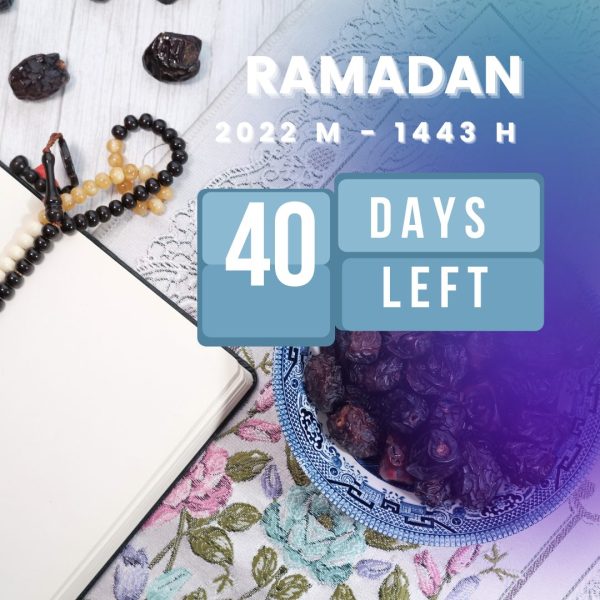How To Get Ready For Ramadan
Table of Contents
ToggleThe holy month, full of love, purity, and sincerity, is on the way. Ma Sha Allah! Ramadan is coming. We have short time for the preparation of Ramadan. It is a blessing of Allah (SWT) that he has gotten us close to something that He loves and is the greatest blessing of Him- the month of Ramadan.
Sow the seed and water it before Ramadan to reap the harvest during Ramadan. Make the most of this run-up to the month of Ramadan. Start with Quran Memorization Or Recitation, observe the 5 daily prayers, practice fasting, give charity and zakat and make the Ramadan preparation checklist. When Ramadan will come after a few days, Alhamdulillah you’ll be used to these things, and you won’t find anything harder.
Get ready for Ramadan with us so you can start the blessed month with full devotion, love, true intention, and sincerity. Join Quran Memorization Course or Quran Recitation Course NOW.
Hadith About Preparing For Ramadan
Traditions of Prophet Mohammed show that it is recommended to fast during Shaaban. Well-known companion of the prophet Anas bin Malik reported that Prophet Mohammed was asked: “Which fast is the most meritorious after the fasting of Ramadan?” Prophet Mohammed replied, “Fasting of Shaaban in honor of Ramadan.”
Every point is important, but Dua is the significant starting point. Make Dua and seek the help of Allah (SWT) through Prophet Muhammad’s (PBUH) way. Indeed, his way is the rightful way.
The Prophet Muhammad (PBUH) used to recite the following Dua:
اَللّهُمَّ بَارِكْ لَنَا فِى رَجَبَ وَ شَعْبَانَ وَ بَلِّغْنَا رَمَضَان
Allahumma barik lana fi Rajab wa Sha’ban wa ballighna Ramadan
“Oh, Allah! Grant us Barakah (Blessing) during (the months of) Rajab and Sha’ban, and allow us to reach Ramadan”.
Read Also: Ramadan Is The Month Of The Quran
Start learning Quran, Arabic and Islamic Studies from the comfort of your Home with the Best Online Islamic School.
Learn Quran, Arabic & Islamic Online
Best Way To Prepare For Ramadan
1- Make Ramadan Preparation Checklist
Start making intentions and plan to get ready for Ramadan.
We make a lot of preparation for the wedding or exam session. Even some prepare six months before the event. Why?
Because we regard them as important things. Ramadan is a beautiful gift from Allah (SWT) to the ummah of Prophet Muhammad (PBUH). It is significant for every Muslim to observe intentions and plans for Ramadan.
Make a Ramadan preparation checklist. Write do’s and don’ts. List down everything that you regret doing or not doing in the last Ramadan. Address these issues and start observing them before Ramadan. Observe your intentions and list down your plan.
- What you are going to do?
- What efforts are you going to make?
- How would you do them?
- When would you do them?
- How often would you do them??
2- Challenge Yourself During Ramadan
Practice the Do’s and avoid the Don’ts before the Ramadan
Ramadan is not only about fasting. It’s much deeper than that. It’s about sacrificing one’s desire for the sake of Allah, suppressing the wish whether be it of eating or any forbidden thing, understanding the pain of other humans, sharing the valuables, giving charity, thanking Allah for the blessings, and repenting for the sins.
We all think that we’ll stay away from the sins of Ramadan, which we have been doing all year-round. But that’s not the reality, as we get addicted to committing that sin.
For example, if you lie often, you won’t be able to stop yourself from lying in the month of Ramadan too. Likewise, you may find it difficult to pray Nafl salat, pray Taraweeh, fast and make extra efforts in Ramadan. The only way to prepare for Ramadan is to practice.
Challenge yourself, make a promise to yourself that you won’t commit the sins from now on. You won’t lie, cheat, hurt someone or miss any of your five obligatory salat.
3- Practice Fasting Before Ramadan
Practice the sunnah fast on the 13th, 14th, and 15th of every Islamic month or every Monday and Thursday.
Practice the fast and start fasting in Rajab and Shaban. We all know that the first three days of Ramadan feel so hard. Train yourself with the sunnah fast. The Prophet Muhammad (peace be upon him) used to fast the most in the month of Shaban.
Usamah bin Zaid said: I said:
‘O Messenger of Allah, I do not see you fasting any month as much as Shaban.’ He said: ‘That is a month to which people do not pay much attention, between Rajab and Ramadan. I am fasting.” (Sunan an-Nasa’i 2357)
If you can’t fast often, you can start with a few days that is sunnah. The Prophet Muhammad
(PBUH) used to fast every Monday, Thursday, and13th, 14th, and 15th of every Islamic month.
You’ll receive amazing rewards and will be able to enter Ramadan with more motivation and full preparation.
4- Connect With Quran To Be Ready For Ramadan
What’s the most important preparation you should do before entering the month of Ramadan?
For this, you’ll need to understand that all the worships you do, particularly in Ramadan, requires a clean heart (free from hatred and envy), pure intention (intention to please Allah, not the world), and khushu.
You can attain these qualities through Quran. Quran nourishes the soul, it cleanses the heart and body and strengthens your bond with Allah.
Quran was revealed in the month of Ramadan, on the night of Lailat Al-Qadr. Strengthen your connection with the Holy Quran before Ramadan so you can reap the results in the blessed month.
What can be a more beautiful way of celebrating Ramadan than reciting, memorizing, and connecting with the Quran?
Challenge yourself that you’ll start your Quran Journey before Ramadan so you can get closer to Allah and get ready for Ramadan.
Read Also: How To Spend Ramadan Effectively
How To Start Your Quran Journey In Ramadan?

Thus, what is your goal this Ramadan to come closer to the Quran? Start your Quran Journey Now by joining one of these courses (Quran Memorization Course – Quran Recitation Course – Tafseer Quran Course) to help you read, recite, memorize, understand and reflect on the book of Allah and start this rewarding endeavor now! We have a variety of courses that build your connection with the Holy Quran. Moreover, We offer Free Trials, Amazing Discounts with Highly-Qualified Teachers.
Don’t forget to seek the help of Allah’s SWT. Indeed, He’s the only one can help and guide to the best.
Ramadan Preparation Checklist
1. Prepare Yourself a Ramadan Planner
Being organized and preparing a detailed Ramadan preparation checklist will help a lot to get spiritually prepared for Ramadan and make the most of this blessed month. And, do not forget to prepare a nice Ramadan preparation message to send to your beloved ones and wish them a Happy Ramadan!
2. Decorate Your Home for Ramadan
The decoration of the house and the traces of Ramadan are noticed by the family and the guests. This enthusiasm in the air will increase your motivation. Neighbors and relatives who visit the house better perceive the value of those blessed days. Because what is beautiful is welcomed in the most beautiful way. You can buy ornaments for your home, or you can make these ornaments as an activity with your family. Here are some home decoration ideas for you;
3. Make a Ramadan Calendar
In addition to the Ramadan preparation checklist, you can also make a simple calendar. Undoubtedly, the ones who are most happy about the arrival of Ramadan are children. Having a hadith or verse written in the pouch prepared for them every day and a small gift next to it will make them much happier than we can imagine!
4. Prepare a Ramadan Corner for Your Children
Sometimes a Masjid made of just cardboard and decorated with lights can give you and your children a sense of worship and love and make you know how to mentally prepare for Ramadan at the same time. Thankfully, you can easily find many ideas on Pinterest.
Ways To Prepare For Ramadan
Renew your Niyyah: Before Ramadan begins, consciously decide to focus on the spiritual parts of Ramadan and to refresh your intention. Think about your motivations for fasting and the advantages you anticipate.
Study up on Ramadan: Learn on the fundamentals of Ramadan, its significance, and the advantages of fasting for the spirit and body. This will inspire you to prepare for the month and help you comprehend its significance.
Organize your physical well-being: Ramadan fasting can be difficult, particularly if you have health problems. To make sure you are physically capable of fasting, be sure to visit a doctor.
Create a schedule: Schedule your activities for the month of Ramadan. Set out your daily schedule, including the times you’ll pray, read from the Quran, and spend time with loved ones.
Cleanse your heart and mind: Spend some time considering your words and deeds, and attempt to cleanse your heart and mind. Focus on good thoughts and intentions and let go of any resentments, anger, or negativity.
Participate in charitable activities: Ramadan is a season when charitable giving increases. Start giving to charities and volunteering at your neighborhood mosque or community center. If you are due in paying your Zakat then Ramadan is the best time to do so!
Why Ramadan Is Important In Islam
The Prophet Muhammad (peace be upon him) received the Quran as a message of guidance during the month of Ramadan. Ramadan is a time for Muslims to consider the Quran’s teachings and make an effort to live by its precepts because they hold it to be the word of Allah.
Ramadan is a time for spiritual refreshment and reflection. Throughout this month, Muslims are urged to perform additional acts of worship, such as prayer, reading the Quran, contributing to charity, and fasting from sunrise to dusk. These deeds support a person’s piety and assist to deepen their relationship with Allah.
The month of Ramadan is a time for fellowship and support. Muslims frequently break their fast with family and friends, and throughout the month many mosques host midnight prayers and iftar. The ties of brotherhood and sisterhood within the Muslim community are strengthened by this sense of cohesion and solidarity.
Ramadan is a time for self-control and discipline. Muslims can apply their newly acquired self-discipline and self-control to other aspects of their lives by fasting throughout Ramadan.
The month of Ramadan is a time for giving and thankfulness. Muslims are urged to contribute liberally to those in need during the month and to express their gratitude for their blessings. As a result, the ties of community and solidarity are strengthened and compassion and empathy for others are fostered.
How To Do Ramadan Fasting First Time
Experiencing fasting for the first time may feel challenging. However, we must know that if we have the right intentions, Allah will make all our tasks easy for us. Here are a few tips that can be helpful.
Having strong intention: make a strong niyyah to keep the fast and remember that you are doing it for the sake of Allah.
Consult your doctor: It’s crucial to speak with a physician before beginning your fast if you have any medical ailments or worries.
Gear up before Ramadan: a few weeks before Ramadan, gradually reduce your calorie consumption and alter your sleep schedule to start preparing your body and mind. This may make entering the fasting period easier.
Do not skip Suhoor: Have a nutritious pre-dawn meal before the fast begins. You’ll benefit from having the energy you need all day long because of this. And also, it is Sunnah!
Drink plenty of water: Consume plenty of water and other liquids throughout the non-fasting hours to avoid being dehydrated. Avoid sugary and caffeinated beverages.
Keep a balanced diet: Have a healthy, balanced meal that contains fruits, vegetables, protein, and carbohydrates when you break your fast, at the time of Iftaar.
Take adequate rest: Don’t push yourself too hard throughout the day. Take it easy. When you need to rest, pay attention to your body.
Grow spiritually: Spend this opportunity to contemplate and concentrate on your spiritual development. Read the Qur’an, make more prayers, and do deeds of love and charity.
FAQs
Getting ready for Ramadan
1- Start Your Quran Journey
Ramadan and the Quran go hand in hand. But it’s important to start Quran memorization or Recitation Course.
2- Have a good translation of the Quran
If you do not understand Arabic so you really connect with the Quran and Allah’s word. There are some really good English translations of the Quran and two I recommend are The Clear Quran and the Majestic Quran.
3- Start Fasting Before Ramadan
It’s Sunnah to fast on Mondays and Thursdays so I try to fast once a week in the leadup to prepare my body and mind for Ramadan. Each day fasted before Ramadan will help your fasts during Ramadan, inshallah!
4- Get Your Prayers in Check
If there’s any time in the year to make sure you are praying all 5 prayers a day. Ramadan is it! Trying to pray all 5 prayers a day leading up to Ramadan if that’s something you usually struggle with or are just getting used to if you are a new Muslim.
5- Charity “Sadaqah”
Ramadan is the best moth for zakat and charity. Sadaqa is charity given voluntarily in order to please God. Sadaqa also describes a voluntary charitable act towards others, whether through generosity, love, compassion or faith.
How to get ready for Ramadan
1- Have good Intentions (Niyyah).
3- Recite the Holy Quran.
3- Make a list of duas.
4- Pray on time.
5- Giving Charity (Sadaqah).
6- Adopt good habits.
7- Using Ramadan planner.
8- Ramadan Iftar food plan.
9- Plan for Eid ul Fitr.
10- Tawbah to Allah.
How to prepare for Ramadan spiritually
1- Correct Your Intention.
2– Straighten Your Relationship with Qu’ran.
3– Making tawbah “Repentance”.
4– Focus in Prayer.
5– Look at Your Manners.
6– Fasting and Du`aa’.
Hadith on preparing for Ramadan
On the authority of Usama bin Zaid, may God be pleased with them, he said: I said, O Messenger of God, I have not seen you fast in one of the months that you fast from Shaban, so he said: “That is a month in which people neglect it, between Rajab and Ramadan, and it is a month in which deeds are raised to the Lord of the worlds, and I like that my work is raised while I am fasting.”
How did the Sahaba prepare for Ramadan
The souls of the companions (may Allah be pleased with them) longed for this generous month, of the great reward that Allah promised. The companions used to prepare themselves to this month and celebrate it by acts of worship and obedience. They companions used to supplicate to Allah for six months asking Him to get them to the month of Ramadan; and they used to supplicate for six months that Allah accept their fasting and other worship in Ramadan.
How should I prepare for Ramadan
–Fast Voluntarily.
–Recite and Reflect Upon the Qur’an.
–Follow the Sunnah and Pray Extra Prayers.
–Repent and Make Dua’a.
–Give Charity.
–Improve Your Character.
–Eat Healthy and Moderately.
How to prepare to fast for Ramadan
–Maintain nutritious diet.
–Make a list of duas.
–Recite and reflect on holy Quran.
–Adopt good habits.
–Ramadan Iftar food plan.
–Plan for Eid ul Fitr.
–Using Ramadan planner.
Who celebrate Ramadan
Muslims all around the world celebrate Ramadan. It is a holy month that comprises fasting, special prayers such as Taraweeh, the sunnah of Suhoor, and many more good deeds. It is a great time to connect to Allah and rekindle our relationships with The Almighty. However, Ramadan is also celebrated by people of different faiths to bestow respect, love, and goodwill toward fellow Muslims.
Who practices Ramadan
A Muslim who has reached the age of puberty and is in good health is expected to practice fasting in Ramadan and perform other obligatory acts too.
Where Ramadan is celebrated
Ramadan is celebrated all around the world, wherever the Muslim population resides. Certain countries such as Indonesia, Saudi Arabia, Turkey, and Iran celebrate Ramadan with great enthusiasm as the majority of the population is Muslim. Other countries with significant Muslim populations Pakistan, India, Bangladesh, Malaysia, Nigeria, and more also actively participate in Ramadan celebrations. Countries such as Austrthe alia, the United States, the United Kingdom, and others with limited Muslim populations also celebrate Ramadan by gathering at Mosques or community centers.
When Ramadan begins
Ramadan begins after the end of the 8th month, which is Sha’ban or Shaban. The moon is sighted in the late evening of the 29th or 30th of Shaban, which marks the end of it and the beginning of Ramadan. Hence, the day of the beginning of Ramadan may vary each year as the Islamic calendar follows the lunar cycle.
Is Ramadan mandatory
Fasting is the fourth pillar of Islam and hence it is mandatory for all healthy adult Muslims or the ones who have attained puberty to keep the fast. Some exemptions are menstruation in girls and women, chronic diseases, and severe illness. However, a person who cannot fast should compensate through other means such as reciting the Quran, offering prayers, helping others, and doing other good deeds.
Is Ramadan optional
Ramadan is not optional or depends on one’s will. It is the 9th month of the Islamic calendar and one who has attained puberty and is a healthy adult must fast in Ramadan and take part in other virtues of Ramadan.
Preparing for Ramadan khutbah
Ramadan is indeed a month of blessings and if we prepare for Ramadan khutba, we should do that wholeheartedly. One should:
- Prepare the Khutba in advance
- Research on the various aspects of the topics
- Cover relevant topics
- Connect with the listeners
- Include examples
- Practice speech and its delivery
- Seek feedback
If you are a listener, then you must:
- Reach the mosque early
- Be ready with appropriate clothes and etiquette
- Listen attentively
- Convey the Important points to your family and friends and who missed the Khutba
- Inculcate the learnings in your life
How many prayers during Ramadan
There are five obligatory prayers and a special prayer called Taraweeh in Ramadan. However, one should also try to pray a non-obligatory prayer such as Tahajjud, Chasht, Ishraaq, and Doha prayers.
Which religion practices Ramadan
Followers of Islam or Muslims practice the holy month of Ramadan.
Ramadan daily checklist pdf
Ramadan daily checklist should have and is not limited to:
- Performing obligatory prayers on time
- Reciting the Quran and its completion
- Dhikr and Azkar
- Lots of supplications
- Helping in the preparation of Suhoor and Iftar
- Offering non-obligatory prayers
- Giving charity
- Sleeping on time and waking up before Suhoor to pray Tahajjud
How to prepare for your first Ramadan
The first step in preparing for your first Ramadan is to educate yourself on the meaning of the month and the customs that are followed. By gradually consuming less food and liquids during the day, you can begin preparing for fasting. Moreover, make sure you’re getting enough rest and drinking enough water throughout the non-fasting hours. Also, make an effort to include more spiritual activities in your daily routine, such as praying more or reading the Qur’an. Also, plan healthy meals recipes that can give you enough energy.


























